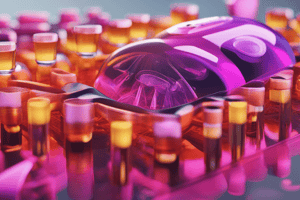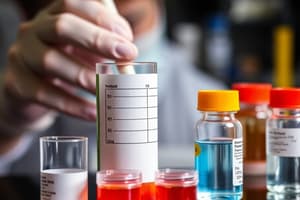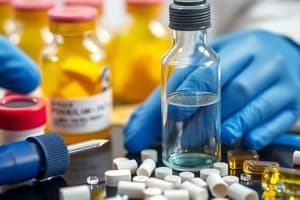Podcast
Questions and Answers
What is the main focus of drug analysis in forensic toxicology?
What is the main focus of drug analysis in forensic toxicology?
- Identifying the deceased individual
- Determining the cause of death
- Detection and quantification of drugs in biological samples (correct)
- Collecting witness testimonies
Which biological sample is most commonly used in forensic toxicology?
Which biological sample is most commonly used in forensic toxicology?
- Hair
- Blood (correct)
- Urine
- Tissue
Which of the following is NOT a factor affecting the choice of analytical method in drug analysis?
Which of the following is NOT a factor affecting the choice of analytical method in drug analysis?
- Specificity
- Type of drug involved (correct)
- Sample type
- Sensitivity
What is the sensitivity level reported for a gas chromatographic method in urine samples?
What is the sensitivity level reported for a gas chromatographic method in urine samples?
Which compounds can be quantified by a developed method with concentrations as low as 0.05 mg/L in blood samples?
Which compounds can be quantified by a developed method with concentrations as low as 0.05 mg/L in blood samples?
What is the main purpose of analytical techniques in forensic toxicology?
What is the main purpose of analytical techniques in forensic toxicology?
Which analytical technique is highly sensitive and can detect trace amounts of drugs and their metabolites?
Which analytical technique is highly sensitive and can detect trace amounts of drugs and their metabolites?
What is a suitable analytical tool for the investigation of drugs in hair samples without derivatization?
What is a suitable analytical tool for the investigation of drugs in hair samples without derivatization?
What is the most sophisticated analytical method currently available in forensic toxicology?
What is the most sophisticated analytical method currently available in forensic toxicology?
Which technique relies on the competitive displacement of labeled drugs from an antibody complex?
Which technique relies on the competitive displacement of labeled drugs from an antibody complex?
Which analytical technique is specifically used to identify individuals based on their genetic material?
Which analytical technique is specifically used to identify individuals based on their genetic material?
In forensic toxicology, which method has improved the sensitivity and specificity of drug analysis?
In forensic toxicology, which method has improved the sensitivity and specificity of drug analysis?
Flashcards are hidden until you start studying
Study Notes
Forensic toxicology is a critical branch of forensics that focuses on the detection and analysis of drugs and toxic substances in biological samples. The field incorporates various analytical techniques to aid legal investigations and determine the actual cause of death. In this article, we will discuss the subtopics of drug analysis and analytical techniques in forensic toxicology.
Drug Analysis
Drug analysis in forensic toxicology involves the detection and quantification of drugs and their metabolites in various biological samples, such as blood, urine, hair, and tissue. The choice of analytical method depends on the sample type, sensitivity, specificity, and precision required for a particular case.
Blood Samples
Blood is the most commonly used sample in forensic toxicology following death. Several studies have used blood to determine a wide range of compounds for forensic analysis. A selective and sensitive method for quantification of morphine and its glucuronides, codeine, and other opiates has been developed, which can detect concentrations as low as 0.05 mg/L or less.
Urine Samples
Urine samples are another common source of drug analysis in forensic toxicology. A gas chromatographic method has been reported to measure blood, serum, or plasma concentrations for more than 40 basic drugs with a sensitivity of 0.05 mg/L or less.
Hair Samples
Hair samples have been found to be effective in the investigation of drugs of abuse, providing simultaneous determinations of different drugs without derivatization. Capillary electrophoresis proved effective for the investigation of hair for drugs of abuse, providing acceptable sensitivity.
Other Samples
Other biological samples, such as bile, gastric contents, liver, and brain tissue, can also be used for forensic toxicology analysis to detect drugs and toxic substances.
Analytical Techniques
Various analytical techniques are employed in forensic toxicology for drug detection and quantification. These techniques include:
Chromatographic Methods
Chromatographic methods are used for separation and identification of drugs. Thin-layer chromatography and gas chromatography are examples of this type.
Mass Spectrometry (MS)
Mass spectrometry is a highly sensitive analytical technique used in forensic toxicology. Gas chromatography-mass spectrometry (GC-MS) is the most sophisticated analytical method currently available, which can detect trace amounts of drugs and their metabolites.
Capillary Electrophoresis
Capillary electrophoresis is a suitable analytical tool for the investigation of drugs in hair samples, providing simultaneous determinations of different drugs without derivatization.
Immunologic Techniques
Immunologic techniques are based on the binding of a specific labeled drug to an antibody. The analysis depends on the competitive displacement of the labeled drug from the antibody complex by the unlabeled drug in the sample.
DNA Typing
DNA typing is used in forensic toxicology to identify individuals based on their genetic material. This technique can be useful in cases where drug-related deaths are suspected to be the result of a specific genetic disposition.
In conclusion, forensic toxicology plays a crucial role in the investigation of drug-related deaths and toxic substances. The field incorporates various analytical techniques to detect and quantify drugs in various biological samples, such as blood, urine, hair, and tissue. The use of modern instrumental methods, including liquid chromatograph-mass spectrometry (LC-MS), capillary electrophoresis, and mass spectrometry, has greatly improved the sensitivity and specificity of drug analysis in forensic toxicology.
Studying That Suits You
Use AI to generate personalized quizzes and flashcards to suit your learning preferences.




